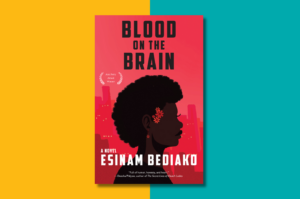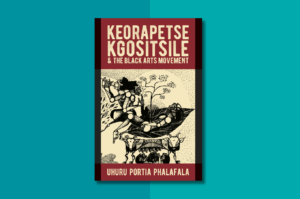Midnight in Moscow
I woke up freezing. I had fallen asleep fully dressed, exhausted from my travels, and yet I felt as though I were standing naked outside. Bed springs groaned in protest as I struggled into a sitting position. The windows were frosted, save for a rough circle at the centre which afforded me a view of the white world beyond. Snow was falling, muting everything in a layer of white. The lightless buildings and leafless trees, the empty cars and empty swings—everything was eerily still, like a life-scale diorama of a winter night. I watched a snowflake tumble through the air, a perfect glittering hexagon, and land on my windowsill in the mound of old snow.
I missed Nigeria severely in that moment. I missed the heat and the sun, the cool trickle of sweet watermelon down my throat, the familiar press of black bodies. How people could survive such cold was beyond me. I wanted to leave already, leave and return home. But I could not return. I could never return. Not after what I’d done. And the thought that I would continue to live like this, forever hiding, forever a stranger in a foreign land …
My eyes drifted to my backpack, and the promise it held of swift exit. But—no. There would be no swift end for me. I deserved to suffer.
Taking off both gloves, I touched my hands to the cast iron radiator, feeling the vestiges of a rapidly vanishing warmth—or perhaps I had imagined it and it hadn’t really been warm to begin with. Either way power had gone out long ago.
I stood there for a moment, my breath misting before me, contemplating my next step. Everything was freezing. Even my balls had retracted into my body. I couldn’t remain like this. I had to get warm. Teeth chattering, I began to rifle through the apartment, pulling open wardrobes and drawers, searching for something, anything, to keep me warm. I cried out with joy when I found some old candles nesting beneath the kitchen sink. But my joy was premature and short-lived, as I soon realised there were no matches to light them.
Moments later I was knocking on the door of room 908, hoping my neighbours were not already asleep.
The door swung open and a bear of a man filled the doorway. Barrel-chested, and extremely hairy, he had hands that looked like they could easily crack open my head.
“Mnye holodna,” I croaked, the foreign words grating my throat. He glowered down at me for a few moments, and I got the idea he didn’t understand a word I said. So I rubbed my arms, miming “cold.”
“Davai, davai!” He boomed, waving me inside.
My first impression of the room beyond was that it was homely. Cramped in a way that felt lived in, as though it had known bodies for a long time; the perfect antithesis to the cold,
hollow mausoleum of my apartment. A merry log fire roared in the oven and I shuddered with relief as its warmth washed over me.
Three knitting women were arranged about a dinner table, wearing purple sarafans, their hair collected in identical pigtails. They looked like three generations of women—daughter, mother, grandmother. They also looked like they might have been the same woman, captured in different stages of her life. They all turned to stare at me.
“H-hello,” I stuttered. “I’m your neighbour.” I pointed in the general direction of room 909. “Sosyed.”
Within moments I was offered a place at the table, a mug of kvass thrust into my hand, and was working my way through a bowl of soup and a loaf of black bread.
“So,” said the grizzled man, watching me eat. “What they call you?”
“Midnight,” I said, between mouthfuls. “Because I was born at night.”
He broke into a wide smile, showing huge yellow teeth, and one gold incisor, glinting in the firelight.
“Midnight!” He roared, nodding like I had said something particularly astute. “Is good name. Things happen at midnight, sometimes good, sometimes bad.” He pointed at himself. “Medved.” Then at the three women, from oldest to youngest. “Tatyana, Tanya, Tanyushka.”
“Nice to meet you,” I said. They stared at me unblinking for several long seconds, then returned to their knitting.
We lapsed into companionable silence, as I finished my food. The three women kept knitting, and I wanted to ask if it was a quilt, or a blanket, or something else (it looked alternatively like a quilt, then a blanket, then a patch of star-spangled sky at night) but I decided not to. Tanya stood up abruptly from the table to feed more fire into the oven.
“Thank you for having me,” I said. “And for feeding me. I really didn’t mean to intrude.”
“Nonsense,” Medved pronounced. “We are happy to have you, we rarely have visitors.” He considered. “No. We never have visitors. Has been long time since have—”
“Medved,” said Tatyana. The word came out as a warning.
“What?” said Medved. “Can’t I talk?”
“You talk too much.”
“I talk too—” he broke off, mouthing wordlessly. Turning to me, “Do you have any idea what is like to live with these three, Midnight? No, you don’t. But I will tell you—”
“Leave the poor boy alone,” said Tanya.
“Why? He’s not complaining. Are you complaining, Midnight?”
“I—”
“See? Not complaining!” He clapped me on the back with a hand so huge I nearly face-planted into my bowl of soup.
I watched them bicker and bicker, and I realised, suddenly, that I understood them. I could not tell if they were speaking Russian, or English, or if indeed they were speaking at all, but I understood them. The room swam, or perhaps it was my head that swam, and I felt pleasurably warm. No longer were the walls brick, but mud; no longer was the roof yellowed water-logged concrete, but made of thatch, with naked blackened rafters running beneath it—rafters I knew had been there a long time, perhaps even longer than I imagined. Medved seemed to have grown hairier, bigger, his face pulled into a long, glistening snout. The three women looked even more identical, their skin almost porcelain-white in the firelight, with bursts of rouge on their cheeks.
“Do you like stories?” Medved was saying.
“What?” I asked.
“Stories. You like em?”
“I … I think so. Nana used to tell me stories as a boy, until father forbade her. Told her it filled my head with unreal things, made me weak.” I thought of Nana, the only light in my childhood, and what it would do to her when she discovered what I had done.
“Ay,” Medved tutted his disapproval. “Only the small minded would think that. Stories are a good thing. They are how ideas are born. People have always told stories. Maybe to make sense of their world, or to make sense of themselves. Maybe to pass a message. But the stories we tell ourselves are what’s important. Because a story makes the person. So I will tell you a story, listen:
“A long time ago, long before the Mongols, when Moscow was nothing but a dream, terrible winters plagued the lands.” He pointed at the window through which I could see swirling snowfall. “You think this is winter? Psssh! Is sunshine, Spring, even, compared to winters of olden days. Now those winters lasted long, and the sun did not show her face, and people starved. Every winter many died. And the old men and old women would sit and think, ‘I am old and have lived a full life. Why eat food that the young can eat, or burn wood that can keep them warm?’ So they began to go into the forest, these old people, saying they’re going to visit Baba Yaga. Now this was just a tale, a … a metaphor for death, for sacrificing oneself for the young ones to survive. But remember I said stories, when repeated, become real. Let me tell you, Midnight: Baba Yaga became real. A real vedma who lived in the darkest places of the forest, where the sun never shines. And in her hut, she received these old folk, and killed them. And ate them. Drink your kvass, Midnight.”
I drank my kvass, enraptured by Medved’s tale.
Medved nodded his contentment, continued, “So it went on, winter after winter, old folk finding their way into Baba Yaga’s cookpot, until the vedma developed a taste for human flesh and came to expect them. But it happened, one day, a young girl went after her beloved babushka into the forest, and soon came upon Baba Yaga’s hut. Baba Yaga cooked her, and the vedma found that she enjoyed the girl more. She had been feeding on the old and wrinkly; but the meat of the young was juicier, the bones softer and richer, and she realised she did not want old people no more. So she began to fly in her mortar into the village to steal children.
“The people were distraught, rightly so. They could not protect their children from the evil vedma. So they began to tell themselves a story, of a bear who was immune to Baba Yaga’s magic, and the only one who could protect them from her. When the next winter came around, like clockwork, Baba Yaga came flying to the village, looking for children. Then a great grizzly came and closed his jaws around her neck, and dragged her into the woods.”
“He killed her?”
Medved shook his head. “Stories are hard to kill. Baba Yaga remains in the minds of the people, and so she keeps on living. Nothing is ever truly dead until no one speaks of it no more. So in winter, she haunts these lands in search of human flesh, and the bear protects the people.”
I sat there, nursing my drink, thinking of stories. If I could rewrite my past with a story, if I could simply turn back the clock, I would. But for all of Medved’s belief that stories create things, it simply wasn’t the case. Life did not work that way.
My eyes fell on the three women, knitting away in perfect synchrony. They had remained silent all through, focused on their task, and it—whatever it was they were knitting—seemed to be almost complete. I could not ignore the urge to ask any longer.
“What are you making?” I asked, finally.
The youngest of the women, Tanyushka, looked at me with doll eyes. “A trap,” she said. “We’re making a trap.”
***
Preorder Jackal, Jackal here: Amazon | Barnes & Noble | Undertow Publications
Excerpt from JACKAL, JACKAL published by Undertow Publications Ltd. Copyright © 2023 by Tobi Ogundiran.










COMMENTS -
Reader Interactions